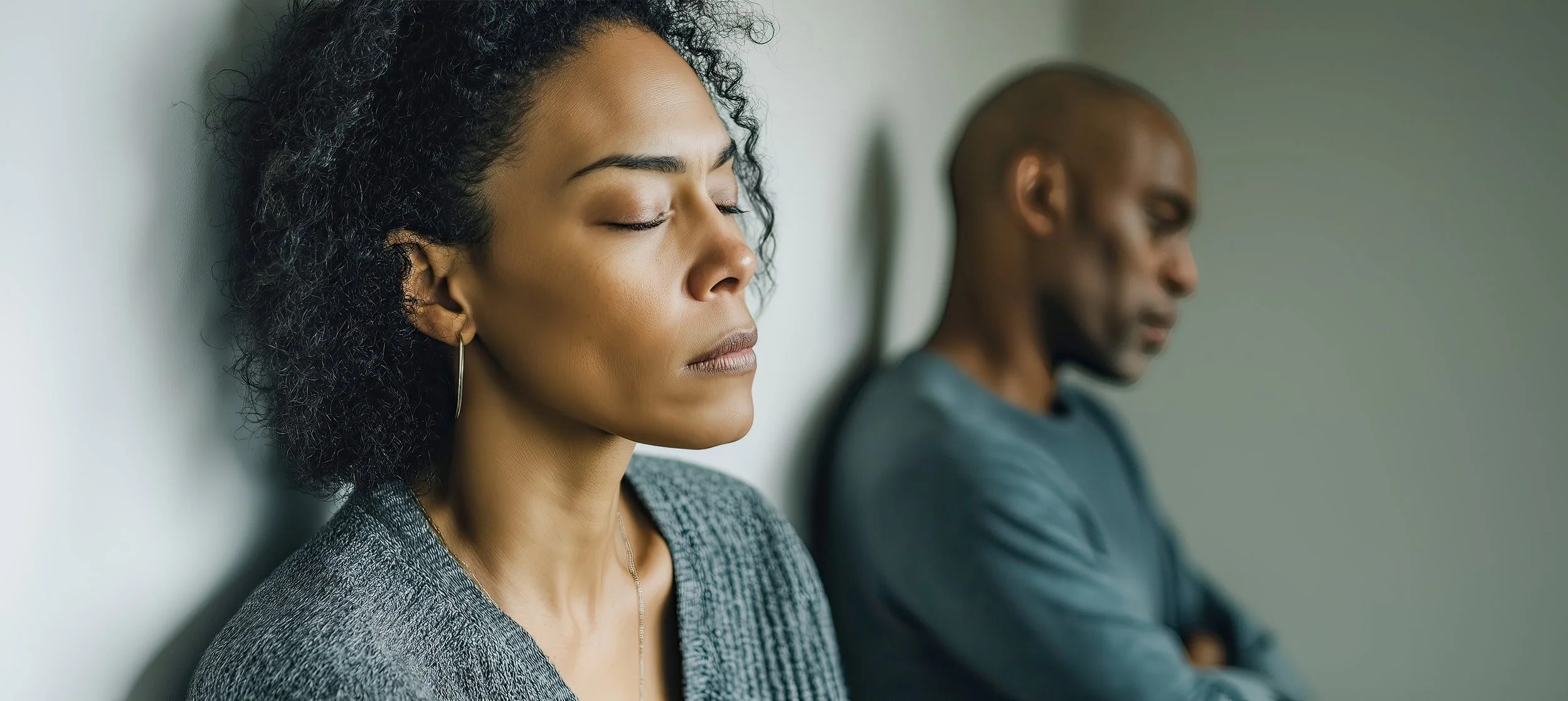What is CoDependency And Why It’s Not Love?
At first glance, codependency can look like love. You care deeply. You give endlessly. You put others first. To the outside world, it can seem like loyalty or devotion.
But here’s the truth: codependency is not love. It’s a survival pattern — one that leaves you drained, anxious, and often invisible.
What Is Codependency? 💔
Codependency in romantic relationships is a pattern where caring for your partner becomes a way to feel safe, valued, or loved. It often plays out with one person falling into the role of the giver and the other into the role of the taker. Over time, this imbalance leaves the giver drained and disconnected from themselves, while the relationship itself becomes lopsided and deeply unsatisfying.
What Codependency Can Look Like 👀
When codependency shows up in a relationship, it might look like:
The giver over-functioning — taking responsibility for the relationship, managing their partner’s needs, emotions, and happiness
The taker relying on this support without giving equally in return
The giver saying “yes” when they really want to say “no”
The giver walking on eggshells to avoid conflict
The giver feeling guilty for taking time for themselves
On the surface, these behaviors can look like love or devotion. But underneath, they are often fueled by fear — not only fear of rejection, abandonment, or losing connection, but also a deeper fear that things simply won’t be okay if you don’t step in. It can feel like the relationship won’t hold together, or that your partner can’t stay stable, cope, or keep things together unless you carry the weight for both of you.
Why Codependency Isn’t Love ❌💖
Love and codependency may look similar from the outside, but they’re not the same thing.
Love is mutual. Both people’s needs matter. In codependency, one person gives until they’re empty, while the other doesn’t step in to meet them.
Love has boundaries. Healthy love says, “I care about you, but I’m still me.” In codependency, the lines blur — you feel responsible for fixing or managing someone else’s life.
Love feels safe. Codependency feels heavy, anxious, and unstable — as if the relationship might collapse unless you keep carrying it.
If your relationship leaves you feeling exhausted, invisible, or one step away from burning out, that isn’t love. That’s codependency.
Where Codependency Comes From 🌱
Codependency often develops in childhood — not because you were weak, but because you were adapting to survive. Here’s how it takes root:
Chaotic or unpredictable households. If a parent’s mood could change without warning — anger one moment, silence the next — you may have learned to read every detail of their behavior. That “hyper-awareness” helped you stay safe as a child, but as an adult, it keeps you stuck focusing on others instead of yourself.
Addiction or mental illness in the family. Children often become caretakers far too young. You may have grown up believing, “If I can just fix them, or keep everything together, then everything will be okay.” That sense of responsibility shaped your idea of love — but it wasn’t love, it was survival.
Emotional neglect. If no one noticed your feelings or needs, you may have learned that the way to connect was by being helpful, quiet, or accommodating. Over time, this taught you to equate love with erasing yourself: “I matter when I take care of others.” As an adult, this can leave you unsure how to let someone in, expect reciprocity, or take up space in a relationship — because it was never something you experienced growing up.
Cultural and generational beliefs. Many families teach that self-sacrifice is the highest form of love. While caring is a strength, taken to the extreme it leaves no space for your own needs — and that isn’t love, it’s self-erasure.
The Cost of Mistaking Codependency for Love ⚖️
The costs of codependency go far beyond exhaustion:
For you: You become the “strong one,” the one who doesn’t ask, doesn’t need, doesn’t receive. Over time, you stop taking up space in the relationship and lose your own voice.
For them: The other person doesn’t develop important skills like emotion regulation, problem-solving, or relational responsibility — because you’re carrying it all for them.
For the relationship: You train a dynamic where you’re always attuned to them, but they don’t learn to attune to you. Real love requires both people to pivot, listen, and respond. But if you never ask, never need, never take up space, they never learn to show up for you.
This means codependency not only drains you — it also stunts the growth of your partner and blocks the possibility of a truly balanced, fulfilling relationship.
What Real Love Looks Like 💞
Love doesn’t demand that one person carry the entire load. Real love is a partnership, where both people take initiative and share responsibility for the relationship’s health.
Real love looks like:
Both partners listening, attending, and responding to each other’s needs
Shared responsibility for emotion regulation and problem-solving
Respect for individuality and boundaries
Balance: both giving and receiving, both strong and vulnerable
Love is not one person disappearing to keep the other afloat. Love is two people building side by side.
How Do You Heal from Codependency? 🌷
Healing begins with awareness — not just of yourself, but of the whole dynamic.
For yourself: Notice when you’re giving out of fear instead of choice, or when you’re silencing your own needs. Learn to ask, to need, to receive — even in small ways.
For the relationship: Recognize how your over-functioning has kept the other person from stepping up. Healing means allowing — and even inviting — them to share responsibility.
Practical steps include:
Practicing small, guilt-free “no’s”
Asking yourself daily, “What do I need right now?”
Allowing space for discomfort when you stop carrying everything
Working with a therapist to heal old wounds and build healthier patterns in a safe space
Holistic Therapy for Codependency 🌟
At the Centre for Mind-Body Psychotherapy, we help people break free from codependent patterns and rediscover what real love feels like.
We use approaches such as:
💑 Couples Therapy
👀↔️👀EMDR (Eye Movement Desensitization and Reprocessing)
🧩 IFS (Internal Family Systems)
🧠 CBT (Cognitive Behavioural Therapy)
🧘 Mindfulness-Based Therapy
With these approaches, we help you:
Heal the roots of codependency so you stop repeating old patterns
Rebuild your sense of worth from the inside out
Learn how to set boundaries without guilt
Create relationships that are mutual, balanced, and truly nourishing
Take the First Step Toward Real Love 💌
If you’ve been confusing codependency with love, you may already feel the toll: the exhaustion, the resentment, the loneliness of never really being met. And if you’ve been carrying that weight for years, you know deep down it won’t shift on its own.
You don’t have to keep being the strong one who never asks, never needs, never receives. You can create relationships where you feel seen, supported, and loved for who you truly are.
🕊️✨ Reach out today to book a consultation at the Centre for Mind Body Psychotherapy— and take your first step toward love that heals, not codependency that drains 💞🌱.

